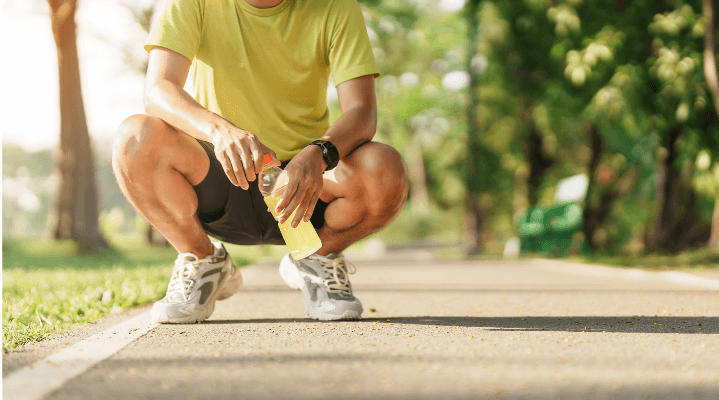
Although exercise such as running is great for your health, both mentally and physically, in the hotter weather running can be harder on the body and can sometimes even be dangerous.
As we hit the prime of summer and the UK enters another heatwave, it’s important to monitor the weather and when exercising outside might be inadvisable. Even if the weather report doesn’t issue specific advice, running the heat should not be taken lightly and precautions taken.
The obvious solution is to not run when it’s too hot, but if you’re following a training plan for an autumn race or want to continue to get the blood pumping, that’s not not always an option. We spoke to Dr David Porter, a sports and exercise consultant at King Edward VII’s Hospital, about what running in the heat can do to your body and how to mitigate the effects.
What are the dangers of running in the heat?
The main risk is dehydration. This starts where you can feel a bit foggy or tired, and go on to develop into heatstroke and sunstroke, with people vomiting or passing out and ending up in hospital.

What are the signs to look out for?
The first signs of dehydration are shortness of breath, some fatigue that isn’t normal to you and excessive sweating. From an exercise perspective, you may find that you’re not able to do what you normally could and are struggling more. You may also find yourself drinking more than you would normally. The tipping point is when you start to feel dizzy or faint; at that point you will need to stop and have a think about adjusting your activity level.
What sort of effect does heat have on the body when exercising?
The heat can increase the impact of exercise on the cardiovascular system. It makes it harder for the heart and makes is harder for the muscles to work. When you’re exercising in the heat you’re having to pump more blood to those muscles in order to generate the energy that you need. When you’re running, the blood is going to your muscles rather than to the brain or your other vital organs, that’s when you’re going to start feeling faint and experience dizziness.
Are people able to adapt to the heat?
This really depends on the person; their health, their age and their fitness level. I have colleagues who have looked after football players for teams in Saudi Arabia, and the players are much more used to moving in very high temperatures. In general they train outside of the hottest time of the day (11am – 3pm in the UK), but there’s no specific temperature at which you shouldn’t exercise.
How long does it take to adapt to hotter temperatures?
Interestingly there has been some research done into this question. What has been found is that elite athletes take less time to adapt because the nature of their jobs means they travel internationally and are used to adjusting to country to country.
If you think of tennis players who move all around the world for tournaments, or European footballers who can play in a range of temperatures within a few matches, they have to adapt quickly.
It would normally take an average athlete between three and six months to adapt properly and that would vary further for a casual runner.

Is it possible to drink too much water?
Yes. When I was a junior doctor, working in emergency medicine and intensive care, I came across marathon runners who had drunk too much water during races and had put themselves into what is called a hyponatremic state – their sodium level had dropped.
When this happens it changes the way your circulations works and changes the structure of the constituent parts of the fluid around your brain as well. When this happens it can lead to seizures and collapses. Many people thing that hyponatremia is a myth but it is a very real condition and deaths can happen. Although it’s something to keep in mind, the majority of people wouldn’t be able to drink the sort of volumes that would get them to that state.
Should you run in the heat?
Running early in the morning or late in the evening is your best bet as this is typically when the temperature is the lowest.
If you can only exercise at lunchtime then swapping your outdoor run for an indoor swim, cycle or run on a treadmill with air conditioning is a smart move. If you’re still running outside then it’s advisable to adjust your route so there’s as much shade as possible.
Slowing down
It’s not a popular thing to say but as the temperature rises and it’s much hotter than you’re used to running in, it could be wise to dial down the intensity of your session. If you’re working with a high training programme such as marathon training plans it can be disappointing to dial back your intensity but it’s important to work with the elements. You can migate the physical stress by either reducing the pace or distance that you’re running.
More information
- If you’ve sustained a running injury, getting an expert medical diagnosis is important for your recovery and future training and competing. Speaking to your GP is a good first step. (Don’t have a GP?)
- Our Sports and Exercise Medicine department will give you an accurate diagnosis and endeavour to get you back running as quickly as possible.
If you need physiotherapy as part of your recovery, our dedicated Physiotherapy Centre is also fully equipped to help you.
Article Sections
Latest Hospital News
Should you wish to speak to our press team, please visit Press Enquiries





